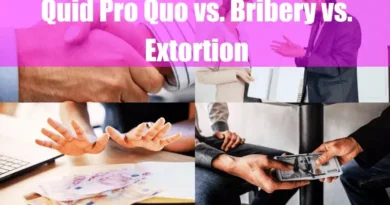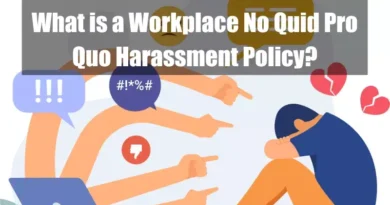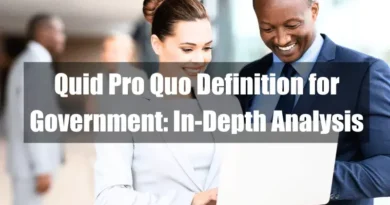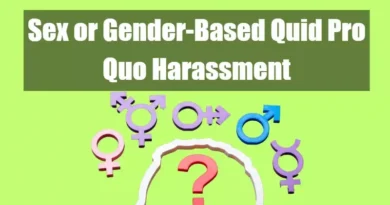Does Quid Pro Quo Violate the US Constitution?
Quid pro quo itself is not necessarily a violation of the U.S. Constitution. The term refers to a basic exchange of something of value between two parties. However, it becomes illegal in certain contexts, particularly when it involves corruption, bribery, or coercion. For instance, if a public official offers or receives something of value in exchange for official actions, this could be considered bribery, which is prohibited under U.S. law. The Constitution’s impeachment process has also dealt with quid pro quo in political matters, where Congress must decide whether such exchanges constitute an abuse of power.
In other settings, quid pro quo can violate laws, such as in the workplace, where it can be linked to harassment. For example, if a manager offers an employee a promotion in exchange for inappropriate favors, it would breach labor laws under sexual harassment policies. Therefore, while quid pro quo may be legal in some situations, it becomes unlawful when it leads to activities like bribery, extortion, or workplace discrimination.

Takeaways
| Key Points |
|---|
| Quid pro quo refers to a mutual exchange of value, which, while not inherently illegal, becomes unlawful when it involves corruption, bribery, or misuse of power, particularly in government or workplace settings. |
| Historically rooted in contract law, the term has evolved in modern U.S. legal contexts, especially concerning political corruption and campaign finance, where the Supreme Court has aimed to prevent “quid pro quo corruption” through legal restrictions. |
| In government, bribery laws such as the Hobbs Act and 18 U.S.C. § 201 prohibit officials from offering or accepting benefits in exchange for official actions, with the Constitution addressing such corruption through impeachment procedures, as seen in the case of Donald Trump’s first impeachment over alleged quid pro quo with Ukraine. |
| In the workplace, quid pro quo sexual harassment, where employment benefits are conditioned on sexual favors, is explicitly illegal under Title VII of the Civil Rights Act of 1964 to protect individuals from coercion. |
| Although the U.S. Constitution does not directly mention quid pro quo, provisions like the Emoluments Clause and principles of due process and equal protection serve to limit its misuse, while recent court rulings have made proving unlawful quid pro quo arrangements more challenging by requiring clear, specific evidence of direct exchanges. |
Introduction
The term quid pro quo refers to a mutual exchange of something of value, where one party provides something in return for something from the other party. While this exchange itself is not inherently unconstitutional, it can become illegal under specific circumstances, especially when it involves corruption, bribery, or misuse of power. The legality of quid pro quo is highly context-dependent, and it is only considered unconstitutional or unlawful if it violates other statutes or constitutional principles.

Historical Background and Legal Definition
Quid pro quo has been a legal concept for centuries, originating in contract law, where mutual promises or exchanges were enforced even without a formal written agreement. In modern U.S. law, the phrase is commonly associated with bribery and corruption, particularly in the political sphere. For example, the U.S. Supreme Court has linked quid pro quo with campaign finance regulations, focusing on preventing “quid pro quo corruption,” where political donations are exchanged for political favors. This type of corruption is illegal and contrary to the principles of fair governance outlined in the U.S. Constitution.
Quid Pro Quo in Government and Bribery

When a public official offers or receives something of value in exchange for an official act, it can be classified as bribery. This type of quid pro quo is strictly prohibited by laws such as the Hobbs Act and 18 U.S.C. § 201, which make it illegal to corruptly solicit or accept something of value in return for influencing any official government decision. Public corruption of this sort is seen as an abuse of power and a direct threat to the integrity of government operations. The Constitution indirectly addresses this by establishing the impeachment process, allowing Congress to remove federal officials, including the President, for “Treason, Bribery, or other high Crimes and Misdemeanors.
The case of President Donald Trump’s first impeachment provides a modern example of how quid pro quo was examined in a political context. The House of Representatives accused Trump of offering a quid pro quo by withholding military aid from Ukraine in exchange for political investigations into his opponent. While Trump was impeached by the House, the Senate acquitted him, and the debate highlighted the complexities of proving illegal quid pro quo in political cases.
Workplace Quid Pro Quo

In a workplace setting, quid pro quo sexual harassment is illegal under Title VII of the Civil Rights Act of 1964. This occurs when employment benefits such as promotions, raises, or continued employment are conditioned on sexual favors. Unlike political or government-related quid pro quo, workplace quid pro quo focuses on protecting individuals from coercion and ensuring fair and equitable treatment in the workplace.
Constitutional Implications
While the U.S. Constitution does not explicitly mention quid pro quo, certain constitutional provisions are designed to guard against the misuse of quid pro quo arrangements. The Emoluments Clause is one such provision that prohibits federal officeholders from accepting gifts, payments, or benefits from foreign states without Congressional consent. While the primary purpose is broader, this provision seeks to prevent quid pro quo arrangements that could compromise national security or the independence of U.S. officials.
In addition, constitutional protections like due process and equal protection help safeguard against corruption. While not directly targeting quid pro quo, these protections could be undermined if public officials engage in selective, discriminatory practices. For instance, if an official grants benefits to certain individuals or groups in return for political support, this may be viewed as unequal treatment, potentially violating the Equal Protection Clause under the 14th Amendment.
Narrowing the Scope of Quid Pro Quo in Law
Recent court rulings have made it harder to prove corruption, especially when it involves quid pro quo agreements, where someone offers something valuable in exchange for a specific political favor. Judges now require more specific and clear evidence that shows an official action was directly tied to receiving something in return. Courts emphasize that general promises or vague agreements are insufficient to prove corruption unless the deal is clearly about a defined official action and the benefit received.
Conclusion
- Quid pro quo, by itself, does not automatically violate the U.S. Constitution. However, when it involves bribery, corruption, or the abuse of public office, it becomes illegal and unconstitutional under various laws and constitutional principles.
- In political and governmental contexts, quid pro quo arrangements are subject to strict scrutiny, especially if they threaten the integrity of public office or undermine democratic processes.
- Similarly, in the workplace, quid pro quo harassment is illegal and violates federal civil rights protections.
- Thus, while the phrase refers to a neutral exchange, its legality depends on the context and the specific circumstances surrounding the arrangement.
FAQ
What is the legal definition of “quid pro quo” in the context of public corruption?
In legal terms, especially concerning public officials, “quid pro quo” refers to an explicit agreement where an official receives something of value in exchange for performing (or refraining from performing) an official act. The U.S. Supreme Court in McCormick v. United States emphasized that for campaign contributions to be considered extortion under the Hobbs Act, there must be an explicit quid pro quo—meaning the payment is made in return for a specific official action.
How does the Hobbs Act define extortion under “color of official right”?
The Hobbs Act defines extortion as “the obtaining of property from another, with his consent, induced by wrongful use of actual or threatened force, violence, or fear, or under color of official right.” In the context of public officials, “under color of official right” refers to situations where an official exploits their position to obtain payments or benefits not due to them, effectively using their office as leverage.
What constitutes an “official act” under federal bribery statutes?
An “official act” involves a decision or action on a question, matter, cause, suit, proceeding, or controversy that may be pending or brought before a public official. In McDonnell v. United States, the Supreme Court clarified that merely setting up a meeting, calling another public official, or hosting an event does not qualify as an official act. There must be a formal exercise of governmental power.
How does the First Amendment intersect with allegations of quid pro quo in campaign contributions?
The First Amendment protects political speech, including campaign contributions. However, this protection does not extend to contributions made with the intent to influence an official act through a quid pro quo arrangement. In McCormick v. United States, the Court held that only explicit agreements where contributions are made in exchange for specific official actions fall outside First Amendment protections and can be prosecuted as extortion.
What is the significance of the term “explicit” in proving quid pro quo arrangements?
The term “explicit” indicates that the agreement between the public official and the benefactor must be clear and unambiguous. In McCormick v. United States, the Supreme Court ruled that for campaign contributions to be deemed extortionate, there must be an explicit quid pro quo—meaning a clear promise or undertaking by the official to perform or not perform an official act in return for the contribution.
How did the Supreme Court’s decision in Evans v. United States impact the understanding of quid pro quo?
In Evans v. United States, the Supreme Court held that the government only needs to show that a public official has obtained a payment to which they are not entitled, knowing that the payment was made in return for official acts. This decision clarified that an explicit promise is not always necessary; the agreement can be implied from the official’s actions and the circumstances.
What role does the “rule of lenity” play in interpreting statutes related to quid pro quo?
The rule of lenity is a legal principle that directs courts to interpret ambiguous criminal statutes in favor of defendants. In the context of quid pro quo and extortion cases, if a statute’s language is unclear regarding what constitutes illegal conduct, the rule of lenity may lead to a narrower interpretation, potentially benefiting the accused.
How does the “color of official right” concept relate to quid pro quo arrangements?
“Color of official right” refers to a public official’s misuse of their position to obtain something of value. Quid pro quo scenarios involve an official exploiting their authority to solicit or accept payments or benefits in exchange for official actions. The Hobbs Act criminalizes such conduct as extortion.
Can implicit agreements constitute quid pro quo in corruption cases?
Yes, implicit agreements can constitute quid pro quo. While McCormick v. United States requires an explicit agreement for campaign contributions to be considered extortion, Evans v. United States allows for implied agreements to suffice in other contexts. The understanding between the parties can be inferred from their words, actions, and the surrounding circumstances.
What is the distinction between “express” and “implied” agreements in the context of quid pro quo?
An “express” agreement is one where the parties involved clearly state and acknowledge the terms. On the other hand, an “implied” agreement is inferred from the parties’ conduct and the circumstances, even if not explicitly stated. In quid pro quo cases, proving an express agreement provides clearer evidence of corruption, but implied agreements can also be sufficient for conviction if the intent is evident.
How does the “honest services fraud” statute relate to quid pro quo arrangements?
The “honest services fraud” statute criminalizes schemes to deprive another of the intangible right of honest services, typically involving public officials or corporate executives. In the context of quid pro quo, if an official accepts bribes or kickbacks in exchange for official actions, they can be prosecuted under this statute for defrauding the public of their right to honest services.
How does the “stream of benefits” theory apply to quid pro quo corruption cases?
The “stream of benefits” theory posits that a series of benefits provided to a public official can establish a quid pro quo arrangement, even if no specific official act is directly tied to each benefit. In United States v. D’Amico, the Court acknowledged that while explicit agreements are clearer, a quid pro quo can be inferred from a pattern of exchanges indicating a mutual understanding between the parties. This theory allows prosecutors to demonstrate corruption through ongoing interactions rather than isolated incidents.
What is the “appearance of corruption” standard in campaign finance law?
The “appearance of corruption” standard addresses public perceptions of integrity in governmental processes. In McConnell v. Federal Election Commission, the Supreme Court upheld certain campaign finance restrictions, emphasizing that large contributions could create an appearance of corruption, thereby undermining public trust. This standard allows for regulatory measures to prevent not only actual quid pro quo corruption but also situations where the public might perceive undue influence over elected officials.
How did the Supreme Court’s decision in McCutcheon v. FEC influence the legal understanding of quid pro quo corruption?
In McCutcheon v. Federal Election Commission, the Supreme Court struck down aggregate limits on individual contributions to political candidates and committees, distinguishing between direct quid pro quo corruption and general influence. The Court reiterated that only direct exchanges of contributions for official actions constitute quid pro quo corruption, while broader influence or access gained through contributions does not meet this threshold. This decision further narrowed the scope of what is considered corrupt under federal law.
How does the “materiality” test apply in honest services fraud cases involving quid pro quo arrangements?
The “materiality” test in honest services fraud cases assesses whether the nondisclosure or misrepresentation by a public official or employee had a natural tendency to influence, or was capable of influencing, the decisions or actions of the entity to which the duty is owed. In United States v. Cochran, the Court applied this test, determining that for a conviction, the government must prove that the undisclosed information was material and that its omission could have impacted the employer’s decisions. This ensures that only significant breaches of duty leading to potential harm are prosecutable under honest services fraud statutes.









